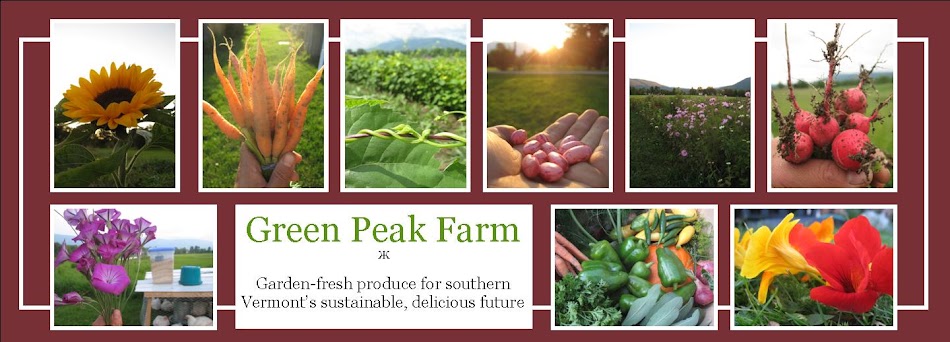I believe that in an ever-shrinking global food economy, where a handful of multi-national companies produce the bulk of vegetable seed available to commercial and home growers, the need to support "food with a face" is imperative on every level. In keeping with this belief, Green Peak Farm is sourcing its seeds from relatively tiny seed companies, and actively selecting seeds that are put on the market as a result of small, family- or employee-owned operations. Seed saving is a lost art in our modern food culture, and by going global, we passively allow a handful of "gloms" to shape our expectations for what food looks, cooks, tastes, travels, smells, and grows like every season. In the same way that you wouldn't landscape a palm tree into your Vermont lawn, we cannot expect tomato seeds genetically programmed and selected to be successful in Monsanto's trial gardens in, say, Florida to work up north. The tomato seeds that make it to you from Florida via Monsanto are being proliferated from only those tomato plants that thrive under vastly different conditions and stresses than your backyard. Wonder what those differences might be? I can't speak for the big guys, but I know that the folks at High Mowing Seeds in Wolcott, Vermont, or my seed-saving friends would be happy to talk about the sources for their favorite tomatoes!
Open-pollinated seeds have parent plants with varietally identical (or close to identical) traits. These seeds will produce a plant that bears viable, "true to type" fruits and seeds from generation to generation.
All Heirloom seeds are open-pollinated, and it is often because of the simplicity of open-pollinated seed production, small scale of seed saving, and the lack of genetic isolation in a backyard or small grower's garden that allows for the preservation of these plants. Owing to the dedication and personal significance of these special strains are often colorful and sometimes hilarious names and stories to boot that help memorialize people, places, and times. Some favorites: "Mortgage Lifter" and "Aunt Ruby's German Green" tomatoes, "Jaluv an Attitude" Jalepeno peppers, and "Vermont Cranberry" dry beans.
Hybrid seeds have parent plants with different varietal traits. As with most first-generation hybrid crosses, these seeds will produce plants that express F-1, or "first filial" Hybrid Vigor and take on the best of both worlds (for example, the sweetness of one parent plant and the early ripening of the other.) Unfortunately, this glory is short-lived, and hybrid seeds bear seeds that are either sterile, or not true to type, often reverting to only one parent type's characteristics. 88% of the tomato seed industry is now hybridized (Fedco Seeds, January '09).
Both open-pollinated and hybrid seeds can be managed organically or not, and heirlooms are not necessarily raised organically, though they are a result of open-pollination. Organic, open-pollinated, heirloom seeds are sometimes brought to market via huge multi-national corporations. Sheesh! It's tough to keep it all straight. But there's hope: the only surefire way to know where and how your food is raised is to ask the smiling face of your local farmer, which sounds like a pretty good insurance policy if you ask me. And, best yet, you might even get a story or two out of it all.

No comments:
Post a Comment